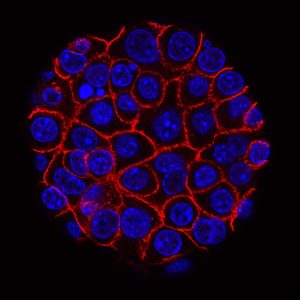
AZ’s first respiratory biologic meets primary endpoints in Phase III trials
pharmafile | September 5, 2016 | News story | Research and Development, Sales and Marketing | AstraZeneca, asthma, benralizumab, biologic, respiratory, severe asthma
AstraZeneca has presented Phase III data at the European Respiratory Society (ERS) international congress which shows that trial biologic benralizumab significantly reduced exacerbations and improved lung function in severe asthma patients.
Severe uncontrolled asthma is a debilitating and potentially fatal form of asthma, where patients’ quality of life is severely impacted and exacerbations can occur many times a year. Benralizumab is an anti-eosinophil monoclonal antibody that induces direct, rapid and near-complete depletion of eosinophils, which are the biological effector cells that drive inflammation and airway hyper-responsiveness in approximately 50% of asthma patients.
In patients with an eosinophilic phenotype, as indicated by the presence of eosinophils in their blood, benralizumab managed to reduce the annual rate of asthma exacerbations by up to 51%. It also managed improvement in lung function, which observed at four weeks after the first doe and sustained throughout the eight week dosing period. Improvements were also found in asthma symptoms, such as wheeze, cough, chest tightness and shortness of breath.
These positive outcomes were found for the eight week dosing regimen, while no additional benefit was observed with four week dosing, which Astr aZeneca indicates may support less-frequent dosing.
Sean Bohen, chief medical officer at AZ, says: “The SIROCCO and CALIMA Phase III trials have shown that benralizumab can offer a meaningful treatment option for patients as evidenced by reductions in exacerbations, improvement in lung function and symptoms, with the promise of fewer doses a year. Benralizumab has a unique way of working in patients with severe asthma with an eosinophilic phenotype and reflects AstraZeneca’s progress in bringing the next generation of respiratory medicines to patients.”
The results of the Phase III SIROCCO and CALIMA trials were also published in The Lancet. The data is intended to support regulatory submissions due to be submitted to the US and the EU later this year.
Sean Murray
Related Content

AstraZeneca shares results for Imfinzi in phase 3 trial for small cell lung cancer
AstraZeneca has announced positive high-level results from the phase 3 ADRIATIC trial, which demonstrated that …

FDA accepts BLA for AstraZeneca and Daiichi Sankyo’s datopotamab deruxtecan for breast cancer treatment
AstraZeneca and Daiichi Sankyo have announced that their Biologics License Application (BLA) for datopotamab deruxtecan …

FDA approves AstraZeneca’s Ultomiris for NMOSD treatment
AstraZeneca has announced that the US Food and Drug Administration (FDA) has approved Ultomiris (ravulizumab-cwvs) …








